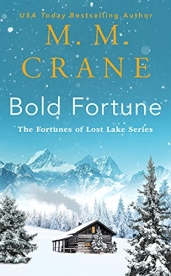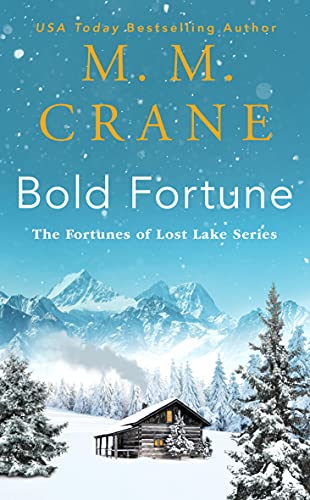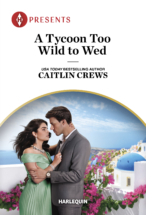Who is M.M. Crane? Megan, of course!
Bold Fortune
Book 1 in the Fortunes of Lost Lake Series
HEAT
LEVEL:
Satisfyingly Spicy
Opposites burn hot enough to melt the snow and ice of an Alaskan winter in this all-new series from USA Today bestselling author Megan Crane.
Quinn Fortune is the official protector of all the unspoiled beauty in Lost Lake, Alaska, as the head of the community trust. A rugged frontiersman through and through, he doesn’t do soft. But he can’t help his fascination with the pink-clad professor who shows up in Lost Lake seeking his approval for her cheerful outsider’s proposal about land that isn’t hers. Still, he agrees to consider it—if she can handle a month of good old-fashioned Alaska living. He’s betting she’ll head back to the safety of the Lower 48 within the week.
Violet Parrish is a thinker, not a doer, but desperate times call for extraordinary measures—like taking on the Alaskan wilderness. In January. Off the grid. With a mountain man hot enough to melt a glacier. The frozen Alaskan tundra should be no match for Violet’s determination, but the sheer immensity of the Last Frontier takes her by surprise—as does her attraction to gruff, impossibly handsome Quinn, and the unexpected heat that burns between them during the freezing Alaska nights…
Start reading
Bold Fortune
Jump to Buy Links →
Listen to the Audio Excerpt →
Violet Parrish, PhD, should have known that her long-distance, never-consummated romance with Stuart Abernathy-Thomason—also a PhD, though the sort who viewed any inadvertent failure to acknowledge his doctorate as a deliberate assault—was doomed.
Looking back, there had been signs of his inevitable betrayal from the start. The long distance itself, because surely it wasn’t that difficult to fly from London to San Francisco, and yet the much-discussed flight had never occurred. It’s been such a busy year, hasn’t it, Stuart had always said mournfully. The failure to engage in even the faintest hint of any intimate acts over their computers, when Violet had read too many articles to count that had insisted that said acts were how couples maintained their relationships across distances. I want you, not a screen, Stuart had told her, and could never be budged.
The glaring fact that when she’d excitedly told him that she was coming to London to visit, after making certain he had a gap in his schedule, he’d initially been excited—then had come back the next day and told her that he’d been called away on those exact dates. What bad luck! he’d said in his plummy voice.
These were all signs Violet would very likely have continued to ignore had there not been the naked-webcam incident.
“I don’t understand,” her boss and mentor said to her now, peering from across the length of his crowded desk at the Institute of San Francisco, a small nonprofit with an academic pedigree and lofty ideals. Irving Cornhauser, too many degrees to choose just one, was often confused for a man in his eighties. He was fifty. “What does a web camera have to do with our work here?”
“I don’t think we should focus on that,” Violet said. She remembered all too well the office-wide effort to teach Irving how to use social media. They’d concluded he didn’t want to understand. She slid her glasses up her nose and braced herself. “The issue is the relationship with Dr. Abernathy-Thomason. My relationship with him. My former relationship, that is.”
She should have felt heartbroken. Wasn’t that the typical, expected response to catching one’s significant other in an intimate embrace with another woman? Then again, maybe this was heartbreak. Having never been in a relationship before—by choice, as Violet liked to remind her mother, because she was an intellectual with other things on her mind—she had nothing to compare it to.
She had not expected it to feel like heartburn, acidic and anger-inducing. With a deep and growing sense of outrage that she was now forced into this position. Standing in Irving’s office on the first working day of the new year, confessing things could only embarrass them both.
“Your personal life is your business, Violet,” Irving said in faintly censorious tones, as if Violet had pranced in here for a cozy giggle about boys. Having never done anything of the sort before, in all the years they’d worked together. “The less said about it, the better. Our role here at the Institute is to lend our considerable focus to small environmental matters that make big differences, and in so doing—”
Violet wanted to scream. But she refrained, because she was an academic, not an animal. “I know the mission. I helped write our mission statement, actually.” But he knew that, of course. “I’m not making a confession because I want to go on a double date with you, Irving.”
He blinked at her in astonishment. Her fault for making reference to the fact that he even had a partner. More personal details he did not care to share on the job. Irving liked to think of these walls as a place of philosophical and intellectual purity. The less reference to the fact that they were humans, complicated, and with lives of their own, the better.
A philosophy Violet had always heartily supported, and yet how the mighty had fallen—to a con man dressed up in a pretty accent. She was surpassingly ashamed of herself.
“The problem is that I discussed my research with Stuart,” she said before Irving could reply, because she wanted to get this out. Stuart’s betrayal and her stupidity had been burning her alive all throughout the Christmas break, when no one at work—especially Irving—answered calls or emails. She’d tried. “And worse, our paper based on that research for the spring conference. I thought it was a circle of trust and I was mistaken. Badly mistaken.”
The acid inside her lit her up all over again as she relived the whole nightmare.
It had been Christmas Eve. She had been at her mother’s place in Southern California, hiding away from too much Prosecco, a selection of white plastic Christmas trees, and the near-constant caterwauling of off-key carolers at the palm trees in her mother’s beach-adjacent compound. She and Stuart had talked as planned, and she hadn’t given much thought to the kinds of questions he always asked her. He was so supportive. He was so interested. Despite her mother’s dire warnings about the lonely lives of sad girls who lived in their heads, he was involved.
Violet had found someone who not only supported her work, but understood it, as Stuart was a part of a think tank dedicated to the same issues. She’d been congratulating herself on that score after the call had ended while enduring a series of frustrating questions from her mother’s sixth husband, who appeared to think Violet taught elementary school students. No matter how many times she corrected him.
Then she’d escaped to the guest room and seen that her laptop was still open. Upon sitting down at the desk to close it, she’d seen that Stuart had not turned his camera off.
It had taken Violet longer than she cared to admit to understand that Stuart had not, in fact, been playing some kind of game with that woman. Right there in his lounge in his tiny flat in London that she knew so well, after a year of looking at it through this same screen.
Naked.
She’d cleaned her glasses with great care, but no. It was still happening when her lenses were clear.
Maybe it really was the heartbreak and the betrayal that made her stomach hurt so much, but on the flight back to San Francisco the day after Christmas—after a holiday packed full of recriminations (hers) and justifications (his), until he’d sneered at her and told her that he’d been using her all along—all she’d really been able to think about was how insulting this all was. And how embarrassing it was going to be to explain to her colleagues.
She’d met Stuart at a conference in Nice last summer. They’d had one marvelous dinner, followed by a perfect kiss, before Violet had raced to catch her flight home. And their romance ever since had involved a great many letters—okay, emails, but she’d felt like a modern-day Austen heroine all the same—and the odd video chat when their schedules allowed.
Far fewer said chats than there probably should have been, she saw that now. And none of them naked. But Violet had been so proud that at last she was having the relationship of her dreams. Not the shattered glasses against the wall, screaming bloody murder nonsense she associated with her parents’ bitter union—finished before she was born but reenacted during custody skirmishes throughout her childhood—and most of their many marriages since.
Her relationship with Stuart had been cerebral, not physical. Violet had been sure that the next time they saw each other in person, the physical would catch up. How could it not? Everyone knew that sexual attraction started in the brain.
Better than the belly, she thought now, while hers continued its protest.
“I’m afraid that I was wrong about Stuart,” she made herself confess to Irving now, because she might have made a horrible mistake but she, unlike Stuart, was capable of facing her own actions. She straightened her shoulders. “Terribly, horribly wrong.”
“Right. Er. Well.” Irving now looked as if she’d slapped him. “I suppose we can’t all be lucky in love.”
“Irving.” Violet was beginning to feel desperate. It was the dread, she thought. It had sat heavy on her this past week and had gotten worse as she’d prepared to come to work today—and that was before she’d seen the press release. “You don’t understand. Stuart has taken our paper that we intended to unveil at the conference, or all its major points anyway, and has presented it as his. His center sent out an announcement this morning with excerpts. He’s claimed all of our theories on new technology avenues for brighter environmental solutions as his own.”
This time, Irving understood her. She knew because he had a tell. She watched, with a strange mix of apprehension and relief, as her boss’s bald head slowly and surely turned an alarming shade of red.
Like a shiny tomato of fury.
Finally.
Irving wasn’t a yeller. He was a seether. He stared at her for a long moment while he grew ever redder, then turned his attention to the computer before him, banging on his keyboard as if it, too, had betrayed him.
But no. Only she had.
Violet’s heart kicked at her, because she loved this place. Because they were such a small nonprofit, they functioned more like a research team—reminding her of her doctoral days. Her colleagues were more like friends and each paper they presented was a communal effort. Their most recent project—half a year of research and debate followed by half a year of drafting the kind of paper that had the potential to shift high-level thinking—had been about specific technologies that might or might not aid in certain proposed environmental protections in remaining wilderness areas, like the Alaskan interior. She wanted to beg Irving not to fire her. She wanted to offer him a host of rationalizations.
But she stayed where she was and she stayed quiet, because she hoped she was woman enough to accept whatever consequences came her way. She’d assured herself she was since Stuart had showed his true colors on Christmas Eve.
Still naked. So naked, in fact, that she’d kept getting distracted by the blinding whiteness of his narrow chest while she should have been laser-focused on his perfidy.
When she heard Irving’s hiss of a breath, she knew he’d found the headlines from the usual industry publications, all of them lauding Stuart for his innovative findings.
Her findings, damn him. Her colleagues’ findings.
“This is a disaster,” Irving whispered. His bald head was still getting redder, which wasn’t a good sign. “Violet. This is a disaster.”
She might have had a week to prepare, but she still wasn’t ready.
“I wanted to be the one to tell you.” She sounded stiffer and more wooden than she would have liked. But there was no helping it—it was that or crying, and she hadn’t cried yet. She refused to cry here. It would be humiliating and also, it might kill Irving. She held out the sheet of paper she’d been holding since she’d walked in here. “I’ve prepared my letter of resignation.”
“I don’t want to accept it,” Irving said, shaking his head. “You know I don’t. I recruited you out of graduate school myself.”
Which wasn’t the same thing as not accepting it, she noted.
“I understand.” Violet swallowed. “I prepared a statement. Explaining the situation to everyone here, so there can be no doubt that I’m taking complete responsibility for my lapse in judgment.”
That was the part that really burned. Violet had always considered her judgment unimpeachable. She didn’t like this discovery that she’d been wrong—that she’d apparently been human and fallible all along.
“Your taking responsibility is all well and good,” Irving said, rubbing his hands over his face. “But there’s the upcoming conference to think about. What do you propose we present now? What will we tell our donors? You know a huge part of our fund-raising is based on the reception our papers receive.”
Violet felt a surge of temper, but she tamped it down. She’d always objected to the Institute’s insistence on focusing on only one idea at a time. Surely, she would argue in meetings, their small size should allow for nimble navigation between many ideas. Not so much communal focus on one thing—though that was what had given the Institute its sterling reputation for intellectual approaches to modern environmental dilemmas. The application of those approaches—in places like universities and corporations or better still, more broadly in the world insofar as that was measurable—was what excited their donors. Violet had always thought they therefore ought to present several papers each year, to better have more nuanced discussions in more directions. But she suspected that if she broached that theory again today, it would be seen as self-serving.
Worse, she honestly couldn’t tell if it would be or not, since as of a week ago, she’d stopped trusting her judgment.
One more reason to detest Stuart.
“We’re going to lose our funding,” Irving moaned. But at least this was familiar ground. As the CEO of a nonprofit, he spent the bulk of his time concerned about funding. And his head was noticeably less red.
Violet was grateful that she’d had this week to plot. To do what she was paid to do here and think outside the box. To frantically research all the projects that had gotten away, either because there hadn’t been enough in-house enthusiasm to make them the idea of the year or because they’d tried to get them off the ground in their initial debate stage, but had failed for one reason or another.
And she’d circled around and around again to the same place. To the big one.
The one dream project that could bring her back into the fold, not just having paid a debt for her sins, but as a rock star.
The very small nonprofit version of rock star, that was, but she would take her polite applause and strained smiles where she could, thank you.
She shoved her glasses into place and cleared her throat. Irving frowned at her.
“As a matter fact,” she told him, “I have an idea.”
Three days later, Violet found herself on an extended layover in the Anchorage, Alaska, airport.
Some people might consider having to suffer through a thirteen-hour layover a kind of penance, but she was choosing to see it as a celebration. Because she’d convinced Irving—and the rest of her colleagues, because, yes, she’d had to face that firing squad of mortification—that she could do this thing no one else in their field had managed to do.
Yet, she told herself.
Not that anyone at work really believed she was capable of the task she’d set herself, of course. She knew better than to believe they had that kind of confidence in her. It was far more likely they were sending her off into the literal dark of the Alaskan frontier in winter because they thought she might very well get eaten by a bear. An effective way for the Institute to wash its hands of her. She could see the solemn statement of genteel regret to the press now.
But bears or no bears, she was doing it. Violet was a thinker, not a doer, and she avoided outside things like the plague—but she was doing this.
She had no choice but to do this.
When it was finally time to catch her plane, one of three weekly flights to a tiny village in the Alaskan bush, it felt a lot like vindication.
The flight was rough—or the plane was small. Maybe both. Her stomach, fragile since Christmas Eve, threatened a full-scale rebellion as they bounced around the clouds. Violet screwed her eyes shut and tried to think about anything else. Anything at all but the fact that she was bouncing in midair over the wild Alaskan tundra she had researched feverishly over the last few days, while trekking back and forth between her apartment in the Marina District and REI in SoMa for the approximately nine thousand things she thought she would need to survive Alaska.
The trouble with the research she’d done was that she knew too well that she was currently flying over some of the most inhospitable terrain on the planet. Knowing that did not exactly help her stomach.
She thought instead about Irving and the way his tomato-headed fury had turned to disappointment, which was worse. She thought about the colleagues she had considered friends, many of whom had been unable to meet her gaze at their last meeting. Even her closest friend at the Institute, Kaye, had looked flushed with quiet condemnation when Violet had dropped off her enormous rabbit, Stanley, who Kaye had agreed to watch for the foreseeable future.
I’m going to fix this, she had declared to Kaye. A little bit fervently.
I wish you’d told me about Stuart, Kaye had replied softly, clutching Stanley to her chest as if using him as a rabbit barricade, her eyes wide and reproachful. He has a reputation.
I’m going to fix this, Violet had said again.
The cargo plane bounced again, hard.
She gripped the armrest, hard enough for her fingers to start cramping, and hoped she’d live long enough to even try fixing it. Something that seemed touch and go for a while there.
Later, happily alive and on icy, snowy, but solid ground, Violet huddled beneath all the blankets on offer in the hotel room she’d booked. And had been lucky to book, as there had been only two options for lodging here in this town of some three hundred souls that was nonetheless considered the regional center of the Upper Kuskokwim region. The area appeared on the map of Alaska as part of the vast swath of wilderness off to the west behind mighty Denali in the Alaska Range. The hardy town of McGrath hunkered down in a curve in the Kuskokwim River called an oxbow, which meant it was surrounded on three sides by water, all of it frozen solid at this time of year. She’d seen it as her plane had come in.
It was only her first stop, however. Tomorrow she needed to figure out more local transport options deeper into the interior toward her final destination in a part of the world that measured distance in air miles. Not only because the distances were vast, but because there were no roads.
She clutched her trusty, much-read guidebook to her chest, having marked many of the pages with stickies—cross-referenced with the other guidebooks that hadn’t made the cut, but which she’d read through two days ago in the bookstore—so she could more quickly reference the important parts when she set off on this adventure.
Like the bear population here in McGrath. Brown bears, grizzly bears, black bears, bears in colors yet to be discovered—she was worried about them all.
But there were no bears in her cozy little hotel room, buffeted by the January winds outside. So instead, she found herself considering the no-less-overwhelming problem of Quinn Fortune. The grumpy, forbidding representative of a critical land trust and the reason she was trekking into the land of endless night and terrifying bears in the first place.
Quinn Fortune, whose response to the well-researched appeal she’d sent him the same day she’d made her confession to Irving was a very short email in return. Blunt, unfriendly, and to the point. He’d announced that he did business only over a beer at his favorite bar and if she wanted to discuss anything with him, he’d see her in the frozen wilderness he called home.
Only he’d used far fewer words.
Violet doubted very much that he expected her to take him up on that offer. But she, by God, was nothing if not prepared to defy expectations if it could get her out of this mess.
And that was how she found herself heading even deeper into the wilderness the next afternoon in an even smaller plane. Because, apparently, Alaskan bush pilots would fly anywhere in any weather, no matter how alarming the flight. The chatty pilot she’d met over breakfast at her hotel kept up a running commentary on the Kuskokwim River that wound around below them as well as the remote, mostly native communities spread out along its banks, stretching some seven hundred miles from Mount Russell near Denali to the Bering Sea far to the west. Violet listened closely, making notations in the margins of her guidebook when appropriate. The pilot told her of past and present mines that brought settlers here from the Lower 48. He talked about the Upper Kuskokwim Athabascan who tended to live western these days while still hunting and fishing in the tradition of their ancestors. He offered many an opinion about the way city folks didn’t really understand the reality of the people who lived out here.
Violet took her notes, nodded along because she suffered from that same lack of understanding, and kept her gaze out the window as much as possible.
Alaska was like a different planet.
Violet had gone to school on the East Coast and had thought she knew her way around a winter, but this was something else entirely. The scale of it was so different. Epic. The guidebook had told her so, and she’d prepared accordingly, but seeing it with her own eyes was astonishing.
There was more snow here than people, a humbling sort of thought.
It was dark again when her new friend landed in Hopeless, home to 103 residents, according to the internet. It seemed to be little more than a handful of hardy, utilitarian buildings clustered together against the howl of the wildness outside.
An actual howl, that was. A metaphor couldn’t have rattled the plane as it bounced to a rough landing.
Or slice straight through her outside the Hopeless General Store after her mercifully brief walk from the spot where her plane had taxied, her glasses fogged up the moment the air hit her.
Inside, the store was ramshackle and cozy at once. There were nonperishable groceries on a selection of shelves, with refrigerators and freezers lining the back wall. The air smelled of hamburgers and coffee, and her belly rumbled as if she hadn’t eaten her weight in hash browns at breakfast back in McGrath.
“You look lost,” came a deep voice.
She looked up and found a man watching her from behind the counter. At first she thought he had to be as ancient as he was large. But a closer look suggested he was merely magnificently bearded and much younger than she’d first imagined, with that slouchy hat and all the plaid.
“Am I in Hopeless?” Violet asked. He nodded. “Then no, I’m not lost. I’m trying to get to Lost Lake.”
“Why?”
She reminded herself that she was out here in a place where there were very few people. Maybe intrusive questions no one would ask in San Francisco were the norm here. Her fingers itched to make a note of that, but she restrained herself.
“I’m looking for Quinn Fortune,” she told him.
The man studied her, not even remotely friendly. Which flew in the face of everything Violet had ever heard about small towns and their supposed charms, but maybe not everything could come with pie on demand and a cheery attitude. “He know you’re coming? Because I figure even Quinn Fortune would come on down and meet an invited guest.” And there was a not-so-subtle emphasis on the word invited.
Violet considered lying but thought better of it. “He does not know I’m coming, as a matter of fact. Though an argument could be made that maybe he should. He issued a challenge and I accepted it.”
“Some challenge,” the man drawled. “It’s hard to get here. Especially from way on down in the Lower Forty-eight.”
Violet didn’t ask how he knew she wasn’t from, say, Anchorage. As she thought about it, in fact, not a single person she’d encountered so far—the hotel owner, the bush pilot, this man—had asked her where she was from. For the first time, it occurred to her that their failure to ask wasn’t because she fit beautifully into these harsh surroundings, despite having bought herself every single thing her guidebook had suggested. Quite the opposite.
She beamed at him as she adjusted her glasses. “I like a challenge.”
And was taken back when, after a moment, the man’s face broke into a broad smile.
“Rosemary!” he bellowed, which didn’t make a lot of sense to Violet until a woman came out to join him at the counter. She looked like someone Violet might encounter on the streets of San Francisco, not way out here in the hinterland. Pierced and ethereal, and her presence recast the man beside her.
Because she’d expected many things in the Alaskan wilderness, like bears. Lots and lots of bears, hence the bear spray in her pack. What she had not anticipated were hipsters.
“This lady came all this way to see Quinn Fortune,” the man said. “On a dare.”
Rosemary moved to the edge of the counter, jutting out a hip to lean against it, her gaze shrewd. “Do you know Quinn Fortune?”
“Only by reputation,” Violet said. And a great many internet searches, but she kept that to herself.
“And you came anyway?” Rosemary asked. Which made the man beside her laugh.
Violet ignored the laughter. “I can see on the map that Lost Lake is some twenty miles away. I’m going to go out on a limb and guess there’s not a taxi service around here. I’m hoping I can charter something to get me there? Or rent some snowshoes, maybe?”
The woman before her looked entirely too entertained. “I’m Rosemary Lincoln. This is my brother Abel. Don’t you worry, we’ll make sure you survive long enough to meet Quinn Fortune. Who doesn’t know you’re coming.”
Violet looked back and forth between them. “That sounds ominous.”
They laughed again. And as neither one of them looked inclined to share why, Violet didn’t ask.
“I’m not usually a taxi,” Rosemary confided. “But this I have to see for myself.”
She disappeared back into the kitchen and when she reemerged, was dressed for the cold. She murmured something to her brother, then led Violet outside into the dark night.
The dark night that had fallen at about 4:20 p.m.
Rosemary stowed Violet’s pack on a sled connected to a snowmobile parked outside, then indicated that Violet should take the high passenger seat to the rear. She climbed on in front, and then took off.
The snowmobile’s headlight gave only rushing, flickering impressions of the small frontier town that quickly gave way to nothing but snow and snow-drowned trees. The engine was loud, and the ride was not particularly smooth, and Violet found herself smiling wider and wider as they bumped along.
Because up above, the stars were their own wilderness in a night sky without the faintest trace of light pollution in any direction.
It was glorious.
Time lost all meaning. She would have sworn that there was no one else alive, anywhere. A stranger was taking her farther and farther away from anything that bore the slightest resemblance to civilization, but she couldn’t work up any sense of alarm.
Violet couldn’t stop smiling, even laughing a little to herself. Not when she’d lived her whole life so far without understanding that she could feel like this. Wild and free and filled with awe, hurtling forward through the endless dark without the faintest shred of fear.
This was what she’d always thought falling in love was supposed to feel like.
Though it certainly hadn’t with Stuart.
When she saw the first light in the distance, she thought it was some kind of subarctic mirage. But as they roared closer, the lights only grew brighter. They were approaching the side of a hill, where it looked as if someone had stacked up a set of buildings like enormous children’s blocks. She had the impression of a kind of big warehouse, red and wide, commanding the base of what seemed to be a haphazard pile of little red houses. There were other winter vehicles parked at all angles in front of it, enough to suggest they weren’t at someone’s home, but she couldn’t imagine what kind of public establishment this was, twenty miles from what passed for a town.
Rosemary parked the snowmobile and when she turned off her engine, the silence seemed to rush in like a hard wind of its own. She swung off the snowmobile, then set about pulling Violet’s bag from the sled in back.
Violet climbed off after her, took her pack, and looked around as she tried to slide the strap over the puffy shoulders of her brand-new parka. She gazed up at the hill, still not quite able to make sense of the jumble of red buildings.
“They call this Old Gold,” Rosemary told her. “Once upon a time it was a gold mine. Trouble was, there wasn’t much gold. Once the men who dug up the land moved on, the folks who stayed on here claimed it for themselves.”
Violet patted her pocket where her guidebook waited, filled with careful maps. “The mine?”
“The mine, the land, and the mineral rights.”
“Who lives here now?”
Rosemary headed toward a wide set of red and white doors that reminded Violet of barns. Or, more accurately, the pictures of barns she’d seen. “That depends on whether the youngest Fox grandchildren are here or in Fairbanks. But it’s never more than twenty.”
“Twenty,” Violet repeated. She saw more people on the way out of her apartment building in San Francisco every morning. “Twenty people count as a town?”
“It takes twenty-five to be a proper municipality. This is a community.” Rosemary nodded her head to the door before her. “And this building is called the Mine.”
She pulled open one set of doors, crossed the small vestibule, then pushed through the next. Violet followed, dazzled by the sudden shock of heat and light. Her glasses fogged over, so she took them off and when she wiped them clear and popped them on again, she found herself standing in . . . an entire little town in one vast space, like a rustic, rural version of the Ferry Building back in San Francisco.
It was magical.
There weren’t the farmers’ markets and high-end food stalls of the Ferry Building here, but there appeared to be a variety of different shops and stalls packed into the big, open room. There were post office boxes to one side, a small grocery, a couple of shiny new ATVs parked near another set of doors, closed against the weather. In one corner she saw a woodstove and leather chairs and, if she wasn’t mistaken, a tiny library. In another corner there were couches arranged around a fireplace. There was a bar at one end and some distance down from it, a space that looked like a diner, complete with a few booths and another set of doors shut tight. Couches arranged around a large fireplace. Longer tables and comfortable, well-loved-looking chairs were scattered here and there, and Violet was so taken with the bright lights and the airiness of the rambling space that it took her a moment to realize that there were . . . people.
Staring directly at her.
“I knew Abel would call up here,” Rosemary muttered from beside her, but Violet barely heard her.
Because a figure detached itself from the bar at the far end and something in her hummed a little, because it was a man.
Only not just any man.
Her heart kicked at her, and she had the sudden sensation that she was back out there on that snowmobile, hurtling through the heedless dark.
He had to be at least six feet and he wore his height with a kind of careless ease that made Violet’s poor, abused stomach flip over and over. He wore utility boots and the kind of heavy-duty all-weather trousers she could see with a quick glance that almost everyone else was wearing, too. He had on a knitted hat that didn’t quite contain all of his unruly dark hair. But this man was also wearing a T‑shirt, of all things, that strained to contain a shockingly well-carved chest and biceps that made her feel deeply, inarguably silly. On a cellular level.
But she promptly forgot all of that, because his face had to be one of the great wonders of the world.
He had cheekbones to die for. There was a hint of dark hair from beneath his hat, and his dark eyes gleamed enough that she suspected at once they weren’t black at all, but something more fascinating, like navy. Midnight, whispered that silly part of her. He had a mouth that should have looked out of place on a man who exuded such rugged masculinity with every step, but didn’t. Maybe because his jaw was unshaven and his lips, sensual though they might be, were pressed together in what looked a whole lot like irritation.
Full-on grumpiness, in fact.
Violet couldn’t breathe and told herself it was a knock-on effect of the cold. That was why everything was tingling. It had to be why.
More amazing, her stomach had finally stopped hurting.
“I’m Quinn Fortune,” he rumbled, but she already knew that. She’d guessed the minute she’d seen him. She’d known on that same cellular level. His voice was as rough and wild as the landscape outside, and it made her feel silly and warm straight through. What was happening to her? “I could have saved you a long, grueling trip. Whoever you are, whatever you want, I’m not interested.”
End of excerpt
Audio Excerpt
Bold Fortune
Rebel Heart Books is my absolute favorite bookshop. I'd love it if you'd support this woman-owned, delightful place where you can also get signed copies. See if this book is available through them. Thanks!

Bold Fortune
is available in the following formats:


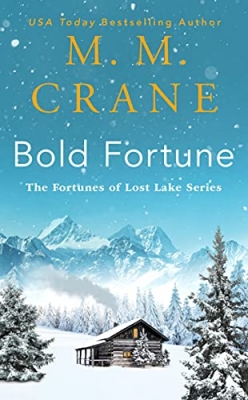

 Book 1
Book 1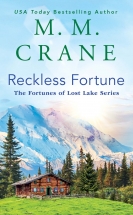 Book 2
Book 2